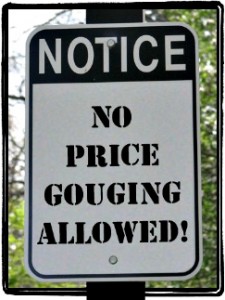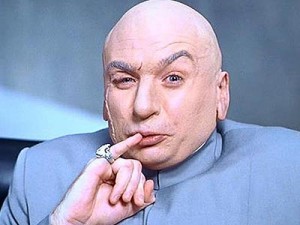Price Gouging
This is likely going to be a more controversial topic, but I urge you to keep an open mind.
I have discovered a few examples in video games where a particular “practice” is demonized and used as part of certain quests that grant you the title of “hero” or other good-aligned perks. I am, of course, talking about “price gouging.” For all intents and purposes, I do not believe that such a thing exists.
A little while ago, I was playing through Assassin’s Creed III and I noticed that there was something about the “beat up” liberation missions that really irked me. In North New York, you are tasked with the responsibility to beat up several merchants who have raised their prices on food due to the war effort. The righteous indignation demonstrate by the game’s characters is what influenced my decision to write this article. The merchants are depicted as evil profiteers, using the excuse of the war to exploit the good people of New York and line their pockets. In real economic analysis, however, the increase of prices due to the sharp increase of demand in wartime holds a very necessary and beneficial part of society.
In my last article, I pointed out where prices come from: supply and demand. This is why McDonald’s cannot sell cheeseburgers for $100 each. This is also why jewelry stores can sell diamond rings for $10,000. Before you can sell something, someone has to want it and then be able to afford it. It does the seller no favors to increase his prices higher than anybody is willing to buy. He would end up with excess stock which translates to money down the drain. In many cases, a seller will have to decrease his prices in order to maximize profits (in this case, I will define ‘profits’ as revenue minus expenses). Likewise, if a seller charged too little for a good, his stores would empty faster than he could restock. Once again he profits less and his business becomes endangered. Remember equilibrium price? That also functions as the seller’s sweet spot. It’s where the seller can make the most amount of profit.
Prices also serve a function beyond telling you the cost of something. They’re called “price signals.” Because the merchants in Assassin’s Creed are charging higher, this gives two different sets of people incredibly valuable information. One, the people living in New York can logically ration their food, as opposed to feeding it to stray animals or throwing extra in the trash. They now know that the demand for this good has increased and can adjust their habits. Two, entrepreneurs who are searching for better ways to profit, can see the increase in revenue made by the food merchant and modify their actions, and use of capital, accordingly, slowly flooding the market with food. This increases the supply of food and brings the prices down to a level that’s more “fair.”

“With prices the way they are, I just can’t enjoy my favorite pastime of dumping water down the sink anymore.”
Now, if you were to upset this cycle by, say, sending a white-hooded man around to beat up people who don’t adhere to their older prices (also known as price-fixing) you end up with the shortage of food that is likely to leave poverty stricken children starving anyway- with no change in the future. People would likely carry on their wasteful habits (at this price-point anyway) and entrepreneurs would invest their time and money in more profitable ventures.
So, keep in mind next time you see a price that seems “unfair.” Don’t assume that some greedy merchant is just trying to exploit the market. He’s just responding to demand. Any established merchant trying to sell his products at extremely high prices will eventually start losing revenue and hurt his business anyway. Plus, the higher he charges, the more he encourages competitors to enter the market. Also, maybe violence isn’t the answer or something.




